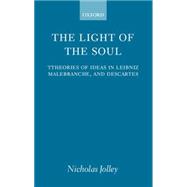
Note: Supplemental materials are not guaranteed with Rental or Used book purchases.
Purchase Benefits
What is included with this book?
| Acknowledgements | p. v |
| A Note on the Translations | p. vi |
| Abbreviations | p. ix |
| Introduction | p. 1 |
| Descartes The Theory of Ideas | p. 12 |
| Descartes Innate Ideas | p. 32 |
| Malebranche The Theory of Ideas | p. 55 |
| Malebranche Vision in God | p. 81 |
| Malebranche Vision in God and Occasionalism | p. 99 |
| Malebranche Ideas and Self-Knowledge | p. 114 |
| Leibniz Ideas and Illumination | p. 132 |
| Leibniz The Defence of Innate Ideas | p. 153 |
| Leibniz Innate Ideas, Reflection, And Self-Knowledge | p. 173 |
| Some Further Developments | p. 189 |
| Bibliography | p. 203 |
| Index | p. 207 |
| Table of Contents provided by Publisher. All Rights Reserved. |
The New copy of this book will include any supplemental materials advertised. Please check the title of the book to determine if it should include any access cards, study guides, lab manuals, CDs, etc.
The Used, Rental and eBook copies of this book are not guaranteed to include any supplemental materials. Typically, only the book itself is included. This is true even if the title states it includes any access cards, study guides, lab manuals, CDs, etc.